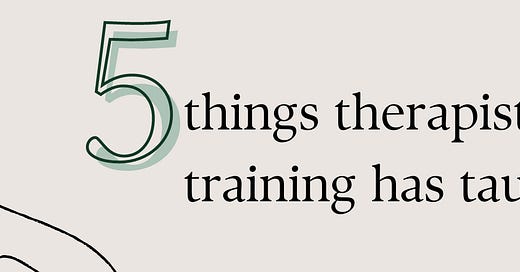What training to be a therapist has really taught me
On honesty and change, and ignoring your brain.
This is the best time of year to drive to college. Golden hour spilling across the fields, soft bends, probably playing folklore or evermore as the soundtracks to autumn. I wasn’t nervous driving to college after the summer holidays. I had been on that very first day a year ago, but this time there was just the tiniest drop of trepidation to my excitement. I want to do well. I want to pass with flying colours and be the best therapist I can be.
Therapist training is hard. You’re forced to bare your soul every week, push yourself out of your comfort zone both in public and private. It’s emotionally demanding, so much so that it very much felt like I experienced a kind of intense therapy during the first year. I changed. A lot.
So, I wanted to sum up for you all the biggest lessons I learned. They have been life-changing, and I know that sounds a bit corny, but I do mean that. Learning about yourself, and learning to accept all those parts of you, is difficult but probably one of the most rewarding things you can do for yourself. It’s also not something that happens overnight but is a gradual, mostly lifelong process.
1. Don’t listen to yourself
Or rather, stop listening to your brain. Yes, that big hunk of meat in your head that controls every single thing you do: stop listening to it.
Our brain is a wonderful thing, but whilst human society has evolved dramatically over the centuries, the brain hasn’t quite caught up. Our brain is designed to be on the lookout for danger and to prime us to escape it at any cost. This is where the fight-flight-freeze-fawn response comes in. When faced with danger, our brain selects one of these four responses.
Now, this was great when danger consisted of sabretooth tigers and the cold dark, and when the danger of social isolation actually did mean death (you didn’t want to be a caveman trying to make it on your own). But whilst this safety mechanism kept our ancestors safe, it can have a detrimental effect on us modern humans.
Since learning that anxiety is just my brain trying to keep me safe, I’ve done a much better job at managing it and dampening the effect it has on my life. So thanks, Brain, for trying to keep me alive, but I promise that upcoming important work meeting isn’t going to kill me.
2. Do listen to others
I don’t mean listen to their thoughts and opinions and give them more weight than your own (in fact, don’t do that), but I do mean actually listen to others.
I had always thought I was a pretty good listener. Therapist training made me realise I was not. Really, most of us are terrible at listening, truly listening, to other people, even the people we care about.
Listening means putting your thoughts and feelings aside and truly paying attention to what the other person is saying. They might be chatting absolute shit, but it doesn’t matter what you think. What they’re telling you right now is important to them, and if you care about them, you at least owe them a moment where you accept what they’re saying as their truth. You don’t have to agree, you don’t have to believe, but understanding that they believe in what they’re saying can make the world of difference to both them and you.
3. Mistakes are human
I feel like this is something that should be easy to accept, natural to acknowledge, but I think especially in this day and age mistakes are vilified. In some circles, particularly online, mistakes are seen as a definitive marking of your character, a sign that you are inherently ‘problematic’ and beyond redemption.
There are some ‘mistakes’ we can never come back from, and rightly so, but the vast majority of our mistakes are human. They’re an opportunity to learn, to reassess, and they do not mean we are terrible people. Perfection is a myth, and to expect perfection from others and from ourselves is disingenuous and exhausting. Not allowing ourselves or others to make mistakes greatly limits us and only heightens division, rather than helping to heal it.
4. Change is inevitable, but you must accept it
We cannot stop time. Shocker, I know, but time is always flowing and change comes as part of it.
Things won’t go to plan. Good things will come to an end. Difficult times lie ahead. But because those statements are true, so are these: things will go exactly as they should. Good things are on the horizon. The difficult times will pass.
Life ebbs and flows and always changes. Happiness is not a permanent state, but neither is sadness or anxiety or grief. One of the most important things I’ve learned is that to maintain long term happiness, you must learn to weather the storms, and a huge part of that is making sure you don’t resist change.
That, I think, is what underpins therapy. You cannot get better, you cannot fix a problem, unless you are willing to accept change in some form.
5. Be honest in everything that you do
I think all these points boil down to this one. Be honest and sincere with yourself and others. Interrogate your thoughts and work out why you’re thinking or doing something. Listen, even when you don’t want to. Strive for integrity, even if that means admitting to a mistake or flaw. Be your authentic self but accept that authenticity often comes hand in hand with adaptation. Because sometimes, being honest with ourselves means accepting that we need to change.





Love this, thank you for sharing. I respect the work of therapists a lot, they are really making the world a better place
Really helpful words